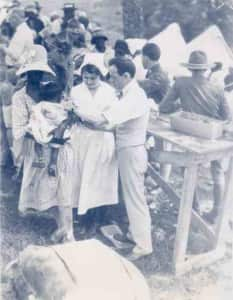Vaccination and anti-vaccination at the turn of the 20th century
By Kristopher A. Nelson
in
April 2010
500 words / 3 min.
Tweet
Share
By near the end of the nineteenth century, Jennerian vaccination had become a generally (but not universally) accepted medical practice. But it still had its critics.

Please note that this post is from 2010. Evaluate with care and in light of later events.

By near the end of the nineteenth century, Jennerian vaccination had become a generally (but not universally) accepted medical practice. But it still had its critics.
Philosophically, they argued on the grounds of personal liberty and autonomy: people should be able to choose whether or not to expose themselves to risk. That is, in essence, individual rights ought to be supreme over society’s larger interests in protecting the majority from harm. Vaccination was “unwarranted governmental interference with human autonomy and liberty.”
Anti-vaccinationists also argued on more scientific or empirical grounds, maintaining that “vaccination was either ‘useless’ or that it was an ‘injurious,’ dangerous procedure.” Others argued that vaccination transmitted other dangerous diseases, like syphilis. Some opponents even maintained that vaccination caused the smallpox epidemic in the Northeast in the early 1900s, and that vaccination was thus responsible for the “slaughter [of] tens of thousands of innocent children.”
One cannot group all anti-vaccinationists into one camp. While there were organized groups opposed to vaccination, there were also individual stories of opposition, like that of Dr. Immanuel Pfeiffer, a Danish immigrant in Boston. A strident anti-vaccionationist, he believed that those in good health were immune from smallpox, and thus that vaccination was unnecessary. In January 1902, in the midst of the Boston epidemic, he visited a smallpox hospital. A month later, he nearly died of the disease. But Dr. Pfeiffer’s theory differed from many other vaccination opponents, who even condemned his hospital visit as “foolhardiness.”
As another example, Reverend Henning Jacobson–or his lawyers–argued in 1905 before the Supreme Court in Jacobson v. Massachusetts that compulsory vaccination violated “the inherent right of every freeman to care for his own body and health in such as way as to him seems best.”
Other anti-vaccinationists maintained that vaccination had significant risks, a reasonable position given the lax controls over vaccination and vaccinators at the time. Some even went further and argued that vaccination itself caused the 1901 smallpox epidemic in the Northeast.
Finally, not all who were opposed to vaccination made it their primary mission: according to Martin Fichman and Jennifer Keelan, “toward the end of the nineteenth century a number of middle class female social reformers began to absorb anti-vaccinationism into their feminist platform,” but it was not the central point of the movement.
The wide variety of anti-vaccination beliefs illustrates the extent of the opposition that emerged when public health officials attempted to use vaccination to fight smallpox outbreaks early twentieth century.
You can read my work ing paper, “Lessons from Smallpox Vaccination,” in its entirety on SSRN.